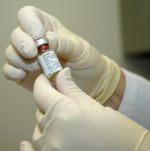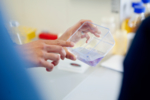Search Results
-
-
-
-
-
-
-
-
-
The Baden-Württemberg healthcare industry https://www.gesundheitsindustrie-bw.de/en/location/infrastructureInfrastructure
-
-
-
-
The Baden-Württemberg healthcare industry https://www.gesundheitsindustrie-bw.de/en/location/start-upCompany foundation
-
-
The Baden-Württemberg healthcare industry https://www.gesundheitsindustrie-bw.de/en/facts-and-figuresAt a glance
-
The Baden-Württemberg healthcare industry Medical technology
Medical technology plays a key role in health and makes a contribution to improving quality of life. The spectrum of medical technology ranges from disposable products, IT-based applications to innovative technologies. In Baden-Württemberg, 836 companies are active in research, development and/or production in this field, making medical technology one of the most important economic sectors in the state.
https://www.gesundheitsindustrie-bw.de/en/location/medtech -
The Baden-Württemberg healthcare industry The biotechnology sector
Baden-Württemberg is currently home to 193 biotechnology companies, most of which specialise in so-called ‘red biotechnology’ - i.e. applications in the medical and pharmaceutical sectors. The biotech sector includes not only traditional biotechnology companies, but also companies from the fields of bioinformatics, diagnostics, analytics and biotechnological production.
https://www.gesundheitsindustrie-bw.de/en/location/biotech -
The Baden-Württemberg healthcare industry The pharmaceutical industry
Baden-Württemberg is the leading location for the pharmaceutical industry in Germany. In addition to international industry giants such as Roche, Pfizer and Boehringer Ingelheim, numerous medium-sized pharmaceutical companies and innovative biotechnology companies specialising in pharmaceutical research and development are also based in this region.
https://www.gesundheitsindustrie-bw.de/en/location/pharma -
-
Dossier - 13/04/2015 
Boosting the immune system can improve cancer prevention and treatment
The activation of the body’s immune system to fight cancer is not only a promising therapeutic concept, but is already used in medical practice. The first immunotherapies have been approved and many more are either in the experimental stages or already undergoing clinical testing. Vaccines to prevent certain types of cancer are already being used successfully around the world.
https://www.gesundheitsindustrie-bw.de/en/article/dossier/boosting-the-immune-system-can-improve-cancer-prevention-and-treatment -
Dossier - 09/03/2015 
Advances in the study and treatment of liver diseases
Liver diseases are often underestimated despite being quite common and potentially having serious and even life-threatening consequences, especially in chronic cases. The most common causes of liver diseases are hepatitis viruses, excessive alcohol consumption, and obesity; congenital or autoimmune liver diseases are quite rare. Thanks to advances in medical research, diseases such as hepatitis B and C can be treated effectively.
https://www.gesundheitsindustrie-bw.de/en/article/dossier/advances-in-the-study-and-treatment-of-liver-diseases -
Dossier - 09/02/2015 
Chemical tools for biological applications
The boundaries between traditional scientific disciplines are becoming less and less distinct. Interdisciplinary cooperation is often required to study complex processes and biomolecular issues. Interdisciplinary cooperation is central to chemical biology.
https://www.gesundheitsindustrie-bw.de/en/article/dossier/chemical-tools-for-biological-applications -
Dossier - 10/11/2014 
Cell and gene therapies from bench to bedside
While cell therapy has become standard treatment for a number of blood cancers, most cell and gene therapy approaches for the treatment of hereditary and metabolic diseases, neurodegenerative disorders and cancer are still in the experimental phases or early clinical trials. However, recent successes give rise to the hope that cell and gene therapies will in future make important contributions to previously incurable diseases.
https://www.gesundheitsindustrie-bw.de/en/article/dossier/cell-and-gene-therapies-from-bench-to-bedside